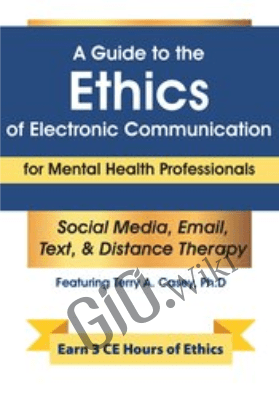A Guide to the Ethics of Electronic Communication for Mental Health Professionals – Terry Casey
A Guide to the Ethics of Electronic Communication for Mental Health Professionals – Terry Casey Download. Electronic communication, such as social media, e…
Overview
Discover the Best Learning with A Guide to the Ethics of Electronic Communication for Mental Health Professionals – Terry Casey
WisMentor is your ultimate destination for online learning. Explore "A Guide to the Ethics of Electronic Communication for Mental Health Professionals – Terry Casey" by top authors and instructors, designed to transform your skills and career. Start now and unlock your potential!
Salepage check: A Guide to the Ethics of Electronic Communication for Mental Health Professionals
Author: Terry Casey

This digital seminar is currently on pre-order meaning that the video will not be ready until 2-3 weeks after the program has taken place.
You know that to be successful as a clinician, you may need to adapt to the technology expectations of your clients.
However, the more you integrate technology into your clinical practice, the more legal and ethical risks arise.
Electronic communication, such as social media, email, text, and distance therapy are here to stay and the unique ethical complexities are growing by the day!
In this recording, Dr. Casey helps you navigate this legal and ethical minefield.
You’ll learn how to:
- Create an action plan to avoid the ethical dangers of social media
- Avoid the aspects of email and texting that can lead to upset clients or lawsuits
- Have a successful and ethically sound distance therapy practice
Whether you’re a counselor, psychologist, social worker, or anyone in the helping professions, this program will provide an indispensable guide for how to thrive in the world of digital technology.
The future of your practice depends on it!
- Establish a social media policy and plan that guards against crossing ethical boundaries with your clients.
- Communicate the various legal and ethical issues that can arise from email and texting, such as HIPAA compliance and privacy issues.
- Specify the unique ethical and legal challenges that can occur when using distance therapy with clients.
Social Media – How to Avoid Ethical Nightmares
- Multiple Relationships and Top Boundary Issues
- Virtual relationships
- Presence on social media: professional vs personal
- Clients’ privacy and social media – Dangers of “creeping”
- Clinical example 1 – Danielle, Facebook & Twitter
- Clinical example 2 – Lauren’s posted pic: Oops!
- Clinical example 3 – “Well, that’s interesting…”: What Jennifer saw
- Creating a Solid Action Plan to Avoid Ethical Issues
- Establish an Effective Social Media Policy (Examples Provided)
- Post social media policy practice/organization’s website
- Incorporating into informed consent process
- Separate personal social media from professional social media
- Respect the privacy of client’s social media presence
Email and Texting – Navigating the Legal Traps
- Encrypted vs Unencrypted Email
- The importance of encrypting emails
- How to encrypt emails
- Recommendations for usage
- HIPAA Compliance Concerns with Texting
- Texting & Client Expectations
- Confidentially & Security Concerns
- Potential for Confusion
- Case Studies:
- Example #1 – Dr. Baron, email and the at-risk client
- Example #2 — Anna and Joy: Texting issues
Navigating Distance Therapy – 6 Ethical & Legal Keys
- Technological Standards Must be Met
- HIPAA compliance
- Business associates agreements
- Practicing Across State Lines
- Subject to the laws/regulations of both states
- Technological Competence and Impact on Client
- Unique Informed Consent Concerns
- Policies and Procedures
- Ensure data protection and avoid unintended access/disclosure
- Insurance Issues
- Client’s insurance policies – reimbursement issues
- Professional liability insurance – Is distance therapy covered?
- Clinical example – Joyce and the distance therapy dilemma
About A Guide to the Ethics of Electronic Communication for Mental Health Professionals – Terry Casey and Our Expert Authors
A Guide to the Ethics of Electronic Communication for Mental Health Professionals – Terry Casey is part of our extensive collection of over 70,000 premium courses at WisMentor. Created by renowned authors and industry leaders, this course is tailored to provide cutting-edge knowledge and actionable insights.
Why Choose WisMentor?
- 🌟 Access courses from world-renowned authors.
- 📚 Wide range of topics to suit your professional and personal growth needs.
- 💼 Lifetime access and flexible learning options.
Key Features of A Guide to the Ethics of Electronic Communication for Mental Health Professionals – Terry Casey:
- ✅ Comprehensive content covering essential topics.
- ✅ Evidence-based methodologies and practical examples.
- ✅ Learn at your own pace with expert guidance.
How to Access Your Course?
Getting started is easy:
- 📩 Receive an instant download link via email.
- 🌐 Access your course anytime through your account dashboard.
- 📱 Compatible with all devices for a seamless experience.
Need Help?
Our dedicated support team is here to assist you. Visit our Contact Us page or reach out via email for any queries or assistance.
More from Our Collection:
Don’t miss the opportunity to explore more courses from top authors and enrich your learning journey at WisMentor. Find your next course now and take your skills to the next level.
